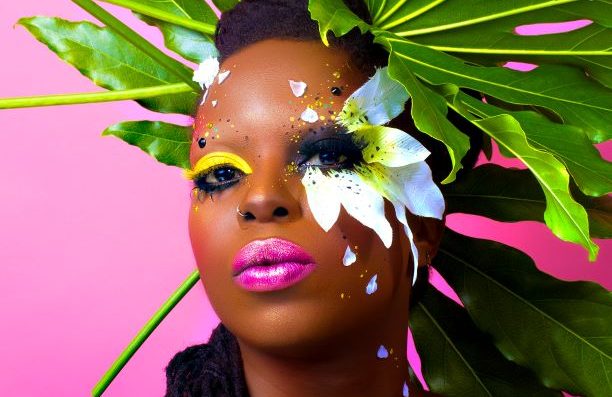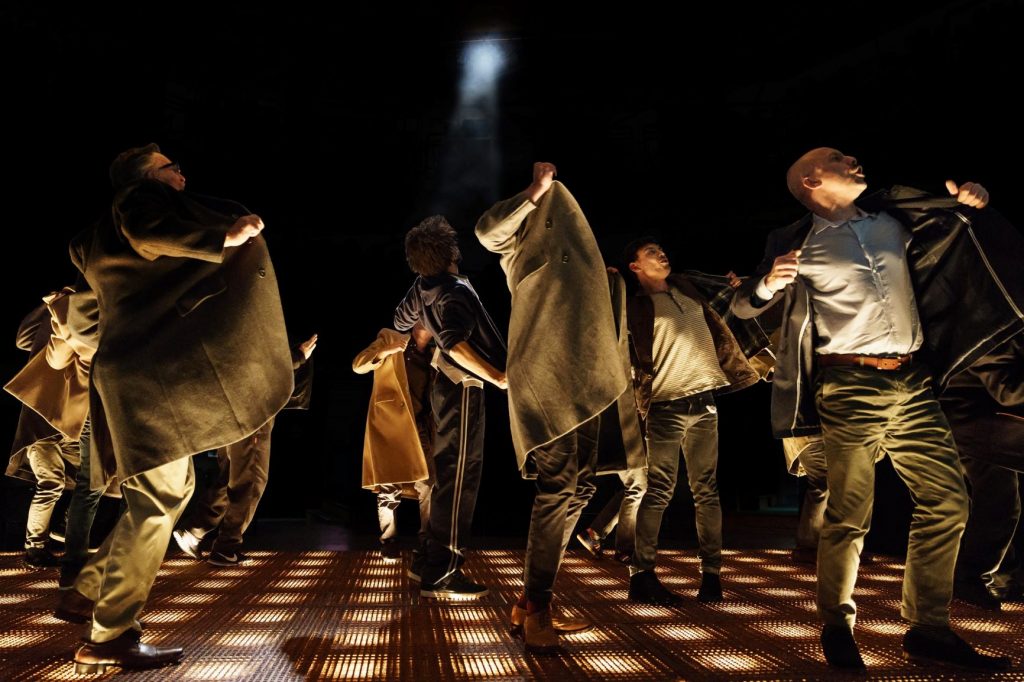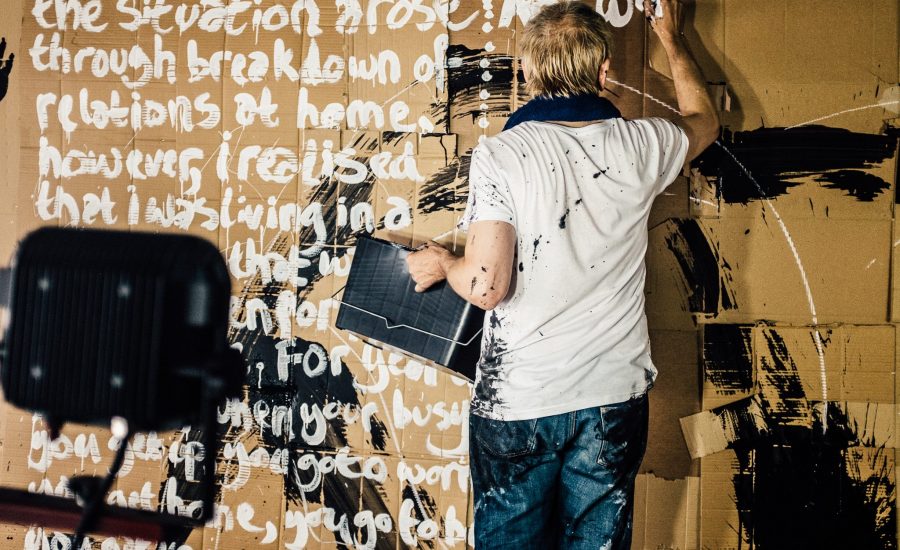In Conversation: Chanje Kunda

In Conversation: Chanje Kunda
“When I’m on stage I get to really be myself.” In Conversation with former MIF Jerwood Fellow Chanje Kunda
Manchester-based playwright, poet and performance artist Chanje Kunda has performed alongside the likes of Benjamin Zephaniah and Linton Kwesi Johnson and produced and toured two full length plays, Superposition and Amsterdam. In 2017 she became one of the first Jerwood Fellows, an MIF and Jerwood Arts creative development programme providing access and insight into how we create international Festival work whilst helping artists develop their own practice. We caught up with Chanje ahead of her new show Plant Fetish, showing at HOME this week to find out how her creative process has developed in the last two years and her top tips for emerging performance artists.
When did you realise you wanted to be a performer?
When I was younger, I went to Contact Youth Theatre in the school holidays. We went to The City Palace of Youth Creativity in St Petersburg twice to do performances which was amazing and I thought:‘Ooh I could get paid to travel and work in theatre!’
I did a degree in theatre – a theoretical degree not acting school. At the time I realised that people just weren’t writing interesting roles for black female actors in theatre. If the show wasn’t written for a black female actor then, as a black female, you just wouldn’t be cast in that role. I decided to do performance poetry for a time because you could still be on stage and perform, but you can write your own words. I always had in the back of my mind my love for theatre.
I wrote a collection of poems called Amsterdam and I decided I wanted to adapt the collection for the stage – like an epic poem. I performed it at Contact theatre and then was lucky enough to perform it nationally including at the Southbank in London. From there things really took off.
What is it you love about performing on stage?
I tried TV but I didn’t like staring down the barrel of a camera and doing 20 takes of the same thing, again and again. I love the live experience of theatre.
When I am off stage I feel like I am acting and when I’m on stage I feel like I get to really be myself – my authentic self. In real life we all wear masks -that we present to the outer world, to our family, to our friends. And then there’s the things that you never present to anybody – that is our truest self. All my shows are autobiographical – I get to be my truest self in the world through performing.
How did your time as a Jerwood Fellow at MIF in 2017 develop you as an artist?
As part of my Jerwood Fellowship with MIF I was paired with Frantic Assembly who created Fatherland for MIF17. At the time I was doing research and development for my show Superposition.
What was great about the fellowship was, it was a paid opportunity where you didn’t have the pressure of having to make work or present anything at the end of it. It was about investing time in your creativity and learning and not having to worry about your bills in the process. As an artist you need space for thinking and having ideas. We all need a bit of freedom for our brains.
When I was observing the creative process of Frantic Assembly I was thinking how it could relate to my own work and how I could use their techniques. Fatherland was an all-male cast and one of the symbols they had was coats. They saw coats as a symbol for fatherhood because it was something that protected you. When I went into rehearsals for my own work Superposition I was thinking about what objects or symbols I could use to express similar themes in my work and I came up with shoes. Shoes are still so gendered – if you go into a trainer shop the women’s section is still full of pink! I was looking at how the different shoes that I wear represent different aspects of me and I worked with a movement director and a choreographer to explore those themes. It gave me so many ideas for new ways to approach my work.
The longevity of Frantic Assembly was also inspiring to me. They made me realise that this could be a lifelong process, which was really exciting. At that time I was thinking: ‘I’m tired of this, maybe I should just get a normal job with security’. Their passion and experience made me see the potential longevity in my own practice.
What three things do you think emerging artists need most?
Space, money and professional development opportunities.
I did a workshop for HOME in October on ‘how to make a living as a performance artist’ and one of the things I was asked was ‘what will set me apart from other people who are also trying to do the same thing?’ I answered; ‘the quality of your work and the quality of your creative team.’ I didn’t go to drama school, I have no formal theatre training but what I did do was invest time in learning and development – whether it be ballet, contemporary dance, acting classes, clowning. If you want to be successful, first of all you have to be really good at what you’re doing.
Why Manchester?
I was actually born in Zambia but I’ve lived in Manchester since I was seven, I also lived in the Netherlands for a bit. But I like to say Manchester is my adopted mum and Zambia is my birth mum.
A lot of people think they need to move to London to become successful but as I often tell them; I’ve got a son and I’ve got a front lawn and a back lawn and a driveway that you could park three cars on, I’m close to the city-centre and I think I’d have to sell all my organs in order to have all that in London! But aside from the preferential property prices – I think London is the only place in the country where you can get run over by a pedestrian!
When I was doing my Fellowship with MIF, there was a project called Manchester Street Poem that was taking the stories of homeless people and presenting them as art to raise awareness of the issues that these people are facing and their individual voices each with interesting stories to tell. I think that artists can work with ‘real people’ to create work about them and for them. And I think Manchester knows how to do this well.
Tell us about your upcoming show Plant Fetish
It’s a comedy show. I’ve basically created for myself a tropical paradise and I invite the audience into my creative world… and I tell the story of how I developed a Plant Fetish. It’s fun but it does have a slight dark side with some serious issues embedded in it. It came about because I was seeing everybody else living their best life on social media, people with more followers than Jesus, constantly comparing myself to other people. And I was thinking a lot about the superficial numbers game that is online dating… which can be quite fatiguing… and you just don’t have the same issue with plants, they don’t send you unsolicited pics. The show is about reminding ourselves that we are part of nature and we don’t need all these ‘things’.
I was at Whitworth Art Gallery when I saw a book called Plant Style which said that plants reduce stress, increase well-being, and bring joy – and so I went out and bought loads of plants. At the time I was on a waiting list to see a therapist on the NHS, I have a diagnosis of Complex Post Traumatic Stress Disorder, and the plants saved me in the interim. I have lots of fun with plants. I’ve learnt a lot from them.
If you could create a show for The Factory – what would it be?
I think for a space that size, I’d like to create some sort of rave performance. There’s such a rave culture in Manchester’s history and I know that it really saved a lot of people. The movement, the dance, the freedom, all those flashing lights, music coming through your body… I think it’s really healing. I just think that with all this austerity, politics and climate change… where is the space for joy?
What are your top tips for emerging artists?
Don’t be afraid to take risks and venture outside your comfort zone. What has helped me recently was something Marina Abramovic said. She says she knows she is an artist because making work is like breathing, like if you don’t do it you are going to die. All artists know what this feels like. Back before I got funding for this show I started a gardening business called Titan Trimmers to finance my show. I was doing all the gardening for my neighbours in the area. There was no way that I wasn’t going to make this show. One of my neighbours recently was like ‘I need my lawn cutting’… I politely told them ‘I don’t do that anymore.’
As we head towards The Factory we’re committed to supporting the next generation of creatives and arts professionals – offering internships, apprenticeships and other professional development opportunities that will help people of all backgrounds to forge careers in the creative industries. Find out about our artist development opportunities here.
Plant Fetish is at HOME 27-30 November, 2019
Find out more about the Jerwood Fellowship





